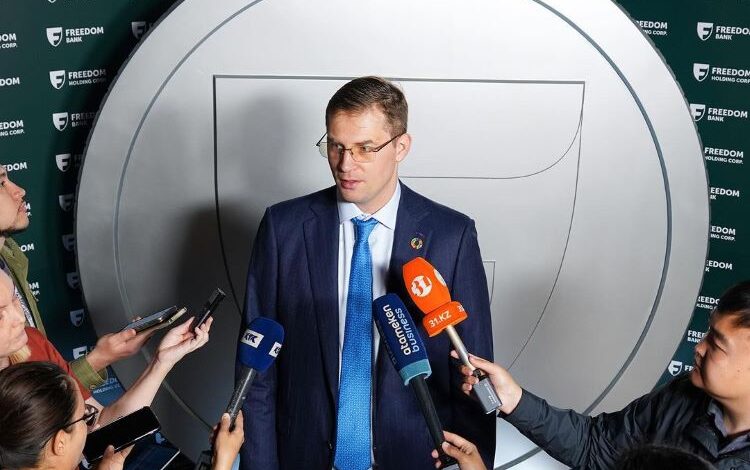Freedom Holding Corp. commits to world changing fintech applications

Timur Turlov, the founder and CEO of Freedom Holding Corp., a US registered diversified financial services firm with headquarters in Kazakhstan, recently gave an exclusive interview to a local magazine called Exclusive.
One of the most significant questions the billionaire was asked was why he chose Kazakhstan as the first market to break into. The answer he gave wasn’t unexpected. Kazakhstan already had a developed banking system, and there were no prohibitions on investing in foreign assets, but with small and localised competitors, the country was a kind of virgin territory where he could do something to become not number 28, but number one.
Turlov had resources and ambition, and, of course, his company had its strengths. “We were product-focused, specifically around investment in the US market – a business segment that was rapidly growing. We were really well managed, very efficient and we knew how to sell. We had a good sales culture in place, and we were very motivated to charge forward,” Turlov said.
“This motivation and our success eventually culminated in my landing on the Forbes list and the expansion strategy into Europe. It is digitalisation that is now creating the greatest added value, and it may come as a surprise to some that Kazakhstan is overtaking the West in the fintech sector due to the integration of financial services with the state. While US-based, and other western companies may be more mature and advanced in terms of development of technology, they still lack state integration,” Turlov explains.
“They don’t know how to provide a mortgage within 24 hours, but for us it has become a norm. We are establishing high standards in the provision of financial services and achieving significant increases in labour productivity. We are becoming a global lab with case study material that could be taken to Harvard as examples of the value we have learned to extract from our digital ecosystems and the products we can generate as a result. Perhaps for the first time in the history of Kazakhstan will we have the opportunity to show the way forward for the fintech industry,” he commented.
When Turlov says that Kazakhstan is number six in the world in terms of the quality of electronic services provided by the state, some market players are surprised. In the US, for example, the average cost of a bank’s operational services to issue a mortgage is approximately $10,500. In Kazakhstan it’s only $200 – which is over 50 times less. In some respects, Kazakhstan’s fintech is even more advanced than that of China.
Turlov is proud of the teams of developers sitting in Kazakhstan and abroad as they develop financial products, such as digital mortgage loans, that can be boasted about in the most important financial capitals. Turlov notes that Kazakhstan has one of the most democratic regimes in Central Asia and that the president of the country constantly emphasises the importance of digitalisation, digital entrepreneurship, and the country’s citizen talent development. Kazakhstan has managed to build an open, and fairly well-structured digital ecosystem.
“We have built one of the best ecosystems with legal access to data. There are countries where it is almost impossible to legally access personal information, and yet, data breaches still happen. We have bona fide participants who obtain this data and create amazing functionality in these interfaces,” Turlov says.
For the last few years Turlov has also been passionate about telecommunications. Superfast, widely accessible, and inexpensive internet in Kazakhstan is his dream and a goal. So far, there are less than 1,000 base stations in Almaty, and it is possible to add another 3,000 by investing more funds. Three terabits per second – and the speed of communication can move Kazakhstan from being ranked 70th place in the world to 40th, as far as digital infrastructure is concerned. Freedom Holding Corp. has already received approval for fixed wireless internet and expects that approvals for mobile communication will be granted in the not-too-distant future.
That is why even though Turlov is a billionaire on the American Forbes list, he has no mansion or villa, and no large savings accounts. The majority of profits are reinvested into business development – which is much more interesting to him than a mansion. Turlov also runs a charitable foundation: because to him, it’s more amazing when life all around you becomes better, and when the country you’re living does not experience radical civil upheavals because of the failure to achieve a higher level of well-being for its citizens.
In 2022 Turlov became a citizen of Kazakhstan, the country where the people are very friendly and where he has felt at home for a long time. He is also happy to be part of Kazakhstan politics.
“I want to be able to look back and say that as an entrepreneur I was able to do everything in my power to make my country better, and that I managed to change something for the better in my country. At the very least we will leave our mark on the development of the digital ecosystem, loan origination, and the creation of advanced technical platforms that will become a new standard in Kazakhstan…and potentially other places around the world.”



